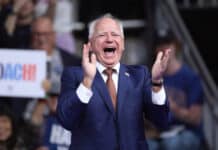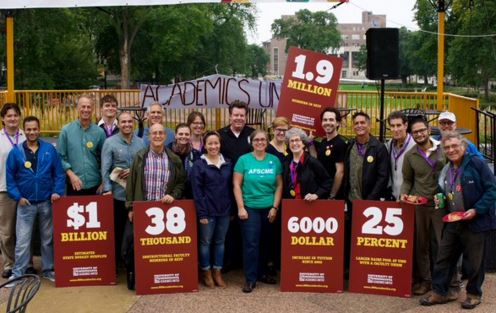The Service Employee International Union (SEIU) has been working hard to unionize the full and part-time professors at the University of Minnesota and has reached the threshold needed to trigger a vote with 30% of U of M faculty signing on for an election. The state will now confirm the petition in order for the University to hold a faculty unionization vote this spring. The Star Tribune reports that there are 2,500 professors impacted, but per the University of Minnesota Office of Institutional Research, there are 3,804 total full-time and part-time faculty on the Twin Cities Campus. The Duluth and Crookston campuses already have faculty unions in place for their 600+ faculty members.
The University is the state’s sixth largest employer and as Alpha News reported in September, the unions who represent some of the 19,000 public employees at the University, have been actively seeking new membership on campus. The University of Minnesota Academic United/SEUI website states that “with our union, we can negotiate wages, benefits, leaves, increased diversity, workload, and more, for the good of our profession, our community, and our students.”
The move comes at a time when Minnesota’s public pension plans are on the verge of a financial crisis. As Alpha News reported in August, the state is $17.6 billion short in funding current obligations under the Minnesota State Retirement System. Current University union membership falls under the under-funded system, while University faculty and administration have their own retirement plan.
Other colleges in Minnesota have been following the trend of unionizing faculty, but the focus has been on part-time or adjunct professors, as The Pioneer Press reports, “Adjuncts at Macalester College and the University of St. Thomas declined to unionize in 2014, but Hamline University adjunct faculty did form a union and recently won raises of 15 percent to 25 percent in their first negotiated labor agreement.” These are private colleges, while the U of M relies on taxpayer funding and tuition to support its operations.
A December ruling by the federal National Labor Relations Board will make unionizing college faculty easier. Inside Higher Ed reports that the ruling “rejected the claims of Pacific Lutheran University that its full-time, non-tenure track faculty members are managerial employees and thus are not entitled to collective bargaining. In doing so, the NLRB offered a set of standards for evaluating whether faculty members are managerial as described by the U.S. Supreme Court in its 1980 ruling inNLRB v. Yeshiva University, a decision that has largely made unionization impossible for tenure-track faculty members at private colleges and universities.”
The LA Times reported today on the movement across California to unionize professors, “Even as unions lose membership in other industries, they have found friendlier turf in academia. Outside California, organized labor has won recent elections at several large private institutions, including Georgetown University in Washington, D.C., and Tufts in the Boston area.” The American Federation of Teachers and the Service Employees International Union have signed up nearly 100,000 part-time academic faculty in the last two years, according to a recent U.S. News & World Report article.
The movement is being fueled by more part-time professors who aren’t satisfied with their benefits and job stability. The LA Times found that “About half of U.S. college and university faculty were full-time in 2011, down from 77% 40 years before that,” according to the U.S. Department of Education.












